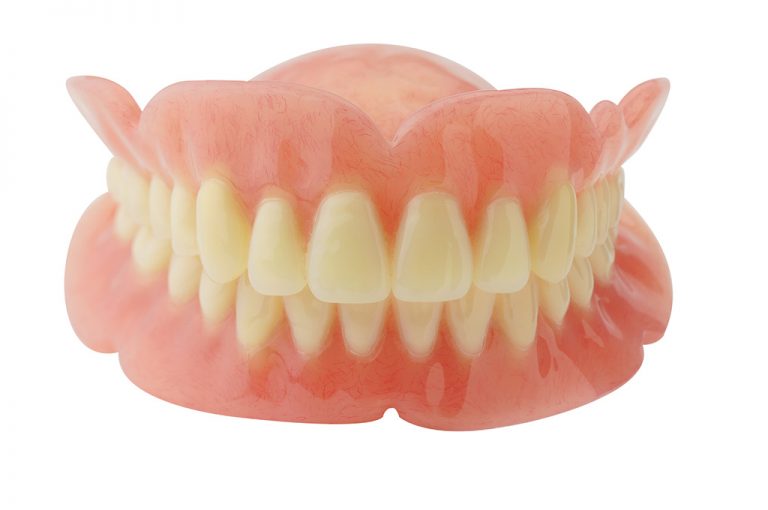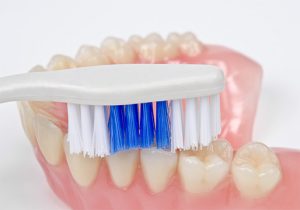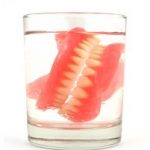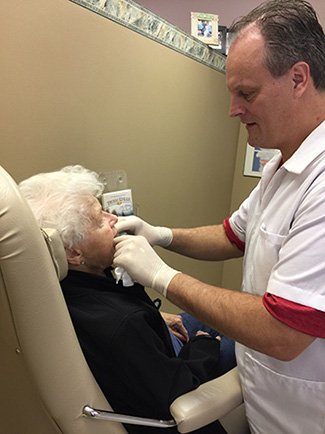Denture Education
NEW DENTURES
When Should You Replace Your Dentures?
Dentures have a useful life of about five years. However, your denturist is the most qualified person to tell you when they need replacing. An annual consultation to have your prosthesis checked and cleaned can prevent many problems among them the bad habits that denture wearers develop and that require adjustments, a new base or reline or even complete replacement.
The following are signs that your prosthesis needs attention:
- Causes discomfort or pain
- It does not adhere to your gums as well as it used to
- It is loose, does not cut food well
- Makes your face look older
Not to mention all the other signs that only your denturist would notice.
Since your denturist constructs your prosthesis themselves he or she actually minimizes the impact of such changes.
Thus, when replacement is indicated, your denturist makes sure that your new dentures conform to the changes that your face has undergone over time. All new dentures require an adjustment period which is entirely normal. Your denturist can give you tips on how to shorten this adjustment period and make it easier.
Remember that wearing dentures that are 10 or 15 years old inevitably causes changes in your mouth that are often irreversible. The longer you delay replacing your dentures, the more your appearance and your comfort will be affected, often gradually and without really noticing. When was the last time you saw your denturist?


Information on this page provided by: Denturist Association
AGING DENTURES
If you have been wearing the same dental prosthesis for more than five years without having it checked by your denturist, you are running unnecessary risks. Too many people believe that dentures are good for 20 years – nothing could be further from the truth! The removable prosthesis is made of a hard, rigid material. Your face, mouth and jaw, on the other hand, change over the years. Because it cannot adapt to these changes and because artificial teeth wear down with time, a prosthesis cannot do its job effectively for more than about five years.
This reality can have devastating consequences, that are often invisible and imperceptible to the wearer of a worn-out denture.
Here is a short list of the most harmful possible effects suffered by wearers of prosthesis more than five years old:
- softening of the gum, painful, irritated gum
- more laborious chewing and more difficult digestion
- headaches, ear aches, neck pain and joint problems
- crumpled mouth and prematurely aged face
- accelerated resorption of the gum . . . . and this is only a partial list!
Very few people maintain their prosthesis properly. Some even neglect to remove it to rest the mouth daily. Don’t take chances with your health! See your denturist annually. When was the last time you saw your denturist?

MAINTAINING YOUR DENTURES
Soft Liners for Sensitive Ridges
Sore Gums? Opt for a soft base. You have been feeling pain in your gums for some time. Your denture hurts, even though it has been meticulously adjusted. You can’t see anything wrong except that, with time your gum has grown thinner and its shape is more pointed. You have also noticed that your dental prosthesis is becoming increasingly loose and uncomfortable. This is a phenomenon known as “gum resorption”. Fortunately, there is a type of prosthesis that can solve these problems: the soft based denture.
Used mainly for lower dentures, the soft base is a liner that is built into your prosthesis. Being more porous, the soft base adheres better to whatever remains of your gum, gives your denture more stability, and is less of an irritant to your mucous membranes. When constructing your prosthesis, your denturist will install the soft base and then “bake” it onto the inside of the denture.
The soft base will not halt the resorption of your gum, whose shape and thickness are constantly changing. To ensure that your new soft base denture provides continued support as time goes by, you should have them checked every year and replaced when necessary. This will extend the health of your gum as well as ensure maximum adherence. Because of its porous texture, the soft base is not an easy material to clean. An annual examination therefore will also prevent hygiene problems. The denturist will be able to recommend some effective cleaning products.
Denture Relines (Same Day)
The denture you are wearing was made and adjusted to fit your mouth at a particular time in your life. With the passing years your mouth changes considerably even as your dentures wear out. This is why your denturist recommends that you have the fit of your denture checked every year to ensure its continued effectiveness and aesthetic appearance, as well as your greater well-being. If proper maintenance and fit of your denture isn’t maintained, the body may produce hyperplasia (excess tissue) to compensate for improper fit leaving a poor foundation to reline or reconstruct a new denture.
Denture Repairs
If your denture is cracked, missing a tooth or needs an adjustment, this can be done while you wait.
Cleaning Your Dentures
Plaque is invisible bacteria film that forms, not only on natural teeth, but on dentures as well. Once it hardens, plaque turns into calculus, which is an open invitation to bacteria, irritations, gum disease, digestive problems, bacteria stomatitis, to name but a few of the harmful consequences of inadequate denture hygiene. To maintain your oral health, maximize your comfort and meet your aesthetic requirements, here is some timely advice from your denturist on the regular maintenance of partial and complete dentures, as well as over dentures on implants.
Brushing
The ideal denture brush has soft bristles and can reach every crevice in your denture. For cleaning, a gel, non-abrasive paste or a mild soap are all appropriate. After every meal, gently brush your denture over its entire surface, paying special attention to the interproximal spaces and to the areas that come in contact with your gums. Brushing too vigorously, using an abrasive paste, or a brush with hard bristles each bring their own problems. The dulling of your artificial teeth, premature wear and tear of your dentures, or thinning of the acrylic lining which affects the fit of your dentures. An acrylic surface that has been scratched by an abrasive substance easily absorb saliva, which carries food particles that cause stains. The result: denture maintenance is much more difficult. It is also recommended that you gently brush your tongue, gums and the roof of your mouth with a moistened, soft-bristle brush. This daily one-minute massage stimulates your circulation and tones your gum tissue, while ridding your mouth of bacteria.
Always brush your dentures over a sink full of water, or a sink lined with a facecloth or towel. This way, if you happen to drop your denture, the impact will be considerably lessened.


Rinsing
Always rinse your denture thoroughly under warm water before putting it back in your mouth or before soaking it. Making this habit will save you from swallowing any cleaning solution, as well as from contaminating your soaking solution. It is also recommended that you rinse your mouth frequently to rid it of proliferating bacteria. This also helps keep your breath fresher longer. What is more, rinsing your mouth with salt water can have an appreciable therapeutic effect.
Polishing
Polishing is a professional technique employed by your denturist to make your denture look like new. Using specialized buffing tools, your denturist restores the glossy finish of your denture, while eliminating the tough stains that elude regular maintenance. An economical step that takes just a few minutes, polishing is recommended once or twice a year, as needed.
Soaking
Prolonged exposure of your dentures to the air can discolour it and dry out the acrylic, making it more brittle. When you remove your denture for the night, keep it in a covered container, filled with warm water or a special soaking solution. Never use bleach to clean or soak your denture. It can weaken the structure of the denture and discolour the acrylic. In any case, bleach will not work as a whitening agent, since the colour of artificial teeth is integrated.
For more advice on maintaining your prosthesis, contact us.
COMMON QUESTIONS:
a word from your local Registered Denturist, David M. Fortunat
- We often receive phone calls from inquiring clients asking:
- How much does it cost for a complete set of dentures?
- How much does it cost for a reline?
- How much does it cost for a rebase? How about a repair, or a soft liner?
- How much does it cost to get my name engraved in my denture?
- Why are they so expensive?
- Can you make partial dentures?
We encourage our potential clients when calling around for estimates, to ask a few more questions than just “What’s the price?”
The following are a few more questions to ask a denturist when calling for a price.
- How many appointments will I need until my dentures are completed? (The answer should be 5-7 for a full set, and 4-5 for a single denture.)
- What kind of acrylic do you use? What kind of teeth do you use?
- What method do you use to make your teeth?
The following are four of the most common methods:
- Pour Technique: uses self-curing acrylic which means it is cured partially sitting on the counter and finishes curing in a pressure pot with warm water at 30 lbs. of pressure.
- Heat Cured Invested Packing Technique: uses stone to invest, is boiled out and then is packed with heat cured acrylic at 3000 lbs/psi then is heat cured in an aqualizer water bath at 163*F for 9 hours. (Temperature and curing procedure depends on brand of acrylic.)
- Microwave Technique: uses a microwave cured acrylic, the process is much like the Heat Cured Invested Packing technique except uses the microwave to cure the acrylic instead of the aqualizer water bath.
- Injected Technique: uses heat cured acrylic which is injected instead of packed and then heat cured.
Denturists can legally make partial dentures, after they have successfully completed the requirements set out by the Province of British Columbia.

FEE GUIDE
All denturists are governed by the College of Denturists of British Columbia. Membership to the Denturist Association of BC is voluntary. The Government has produced an Act, “Health Professionals Act – Bylaws and Policies”, which all denturists must abide by. A fee guide is developed by the Denturist Association of B.C. with minimum rates denturists should charge and it is recommended that we all follow this fee guide. Our code of ethics state, “members must not decrease fees to any particular patient because that patient has a dental plan or similar third party coverage, or for any like reason. (Page 3:I Code of Ethics) Some Denturists offer a 3 tier system in which the client may choose the teeth they would like, depending on the quality. The price should be a reflection of the quality of teeth provided.
The purpose for denturism is to offer a specialized service to the public at an affordable price. Dentures are not expensive when compared to other expenditures we incur annually, monthly, or even weekly such as car insurance; food costs; cosmetics; pet expenses; life, disability, fire, theft, and home insurances; entertainment, property taxes, etc.
If you cannot afford to pay for a new denture, ask your denturist if he/she offers a payment plan. A good set of dentures aids your nourishment and therefore gives you a higher quality of life. You are WORTH IT!
To book a consultation, contact David M. Fortunat Denture Clinic at (250)768-8857. In emergencies, please call (250)300-6437.
All plans accepted.
Office Hours: Monday to Thursday, 9:00 a.m.-5:00 p.m. Fridays, 9:00 a.m.-12:00 p.m.
Saturdays and Evenings by appointment.
David M Fortunat Denture Clinic
6 - 2448 Main Street
West Kelowna, British Columbia
Canada V4T 2S7
